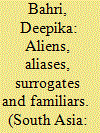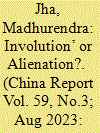|
|
|
Sort Order |
|
|
|
Items / Page
|
|
|
|
|
|
|
| Srl | Item |
| 1 |
ID:
107608


|
|
|
|
|
| Publication |
2011.
|
| Summary/Abstract |
Terrorism, and particularly its militant Salafist form, remains an oft-discussed but often poorly understood phenomenon. There is an ever-expanding body of literature on militant Salafism in the West. A great deal of this offers some manner of alienation as an explanation as to why a path of militancy was pursued. This article explores what explanatory value alienation is felt to offer such accounts. It then considers some of the considerable problems that face these claims, difficulties that seriously undermine the usefulness of alienation as a concept that helps us to understand militancy.
|
|
|
|
|
|
|
|
|
|
|
|
|
|
|
|
| 2 |
ID:
188023


|
|
|
|
|
| Summary/Abstract |
The dominant academic narrative portrays British Muslim communities as alienated by counter-terrorism policies and consequently reluctant to cooperate with authorities by taking action against Islamist extremism. This article reassesses and nuances the “alienation narrative” with the use of unique data from three robust surveys of British Muslims. It finds that although a minority shows signs of alienation, most British Muslims are satisfied with and trust counter-terrorism policies as well as the government and the police. The level of willingness to take action against Islamist extremism is also high. The study confirms that aspects of alienation correlate with reduced willingness to take action against Islamist extremism, although they do not necessarily lead to disengagement.
|
|
|
|
|
|
|
|
|
|
|
|
|
|
|
|
| 3 |
ID:
120703


|
|
|
|
|
| Publication |
2013.
|
| Summary/Abstract |
In this essay, I argue that alienation and familiarity serve as mobile matrices for understanding the affectively experienced impact of transnational migration in certain of Jhumpa Lahiri's short stories. While we may think of alienation as a precondition of migrant identity, it is a condition that is familiar to most of us in different contexts. How does alienation, thus plurally conceived, figure in the experience of migrants, producing the relay between heimlich/unheimlich experiences? Moreover, in the socio-cultural context of globalisation, how does transnational migration challenge conventional notions of family, a word associated with notions of familiarity and filiation that are seemingly antonymous to the idea of alienation? These are the questions I set out to answer, concluding that the 'family' is always a unit composed by its very hauntings, surrogates, and absences.
|
|
|
|
|
|
|
|
|
|
|
|
|
|
|
|
| 4 |
ID:
143361


|
|
|
|
|
| Summary/Abstract |
This paper estimates income polarization in China from 1978 to 2010 and decomposes the estimated polarization by population subgroups. In addition, a framework is proposed to disentangle a change in polarization into a growth and a redistribution component. This framework is then used to quantify the contributions of various income sources to a rise in polarization in China between 2002 and 2007. The analytical results suggest that (1) income polarization exhibited a broadly increasing trend from 1978 to 2010; (2) income polarization was large and rising among rural citizens, while low and declining among urban citizens; polarization of migrants also declined; (3) geographically, income polarization rose in east and particularly central China, while west China was most polarized with little change over time; and (4) the rise in polarization between 2002 and 2007 was mainly driven by the investment income, followed by transfers. Conversely, business income is polarization-reducing, especially in rural China. To a lesser extent, wage is also polarization-reducing, especially among migrants.
|
|
|
|
|
|
|
|
|
|
|
|
|
|
|
|
| 5 |
ID:
193179


|
|
|
|
|
| Summary/Abstract |
‘Nei Juan (内卷)’, translated as ‘involution’, was the ‘buzzword’ in Chinese social media in the year 2020. With ‘involution’, two more phenomena widely known as the ‘Sang Wenhua (丧文化)’, loosely translated as the ‘culture of dispiritedness’ and ‘Tangping Zhuyi (躺平主义)’, loosely translated as ‘lying flat-ism’, gained currency. If ‘involution’ is the issue the urban youth of China is facing in a commercialised and competitive China of today, then ‘dispiritedness’ seems to be its symptom, and ‘lying flat-ism’ its cure being adopted by the ‘dispirited’ youth. As a result, a few questions naturally arise. Is ‘involution’ a new issue that the Chinese urban youth is encountering today? Or is ‘involution’ in itself yet another symptom of a larger issue, ‘alienation’? My inquiry into these questions makes me turn towards films. To find the answers, I take up the works of Jia Zhangke, the central theme of whose works I describe as ‘the desultory wanderings of the alienated souls’. I argue that a critical and close reading of his ‘Hometown Trilogy’, will present us with such youth, who in the face of the rapid changes brought by the post-1979 economic reforms, were filled with a sense of powerlessness, meaninglessness, normlessness, isolation and self-estrangement, all forms of alienation as proposed by Melvin Seeman. I also look into the genesis of ‘involution’ and its manifestation to argue that the Chinese urban youth experiencing ‘involution’ and thereby ‘dispiritedness’, are experiencing the same subjective feelings of alienation as experienced by the youth in the Jia’a ‘Hometown Trilogy’.
|
|
|
|
|
|
|
|
|
|
|
|
|
|
|
|
| 6 |
ID:
127683


|
|
|
|
|
| Publication |
2011.
|
| Summary/Abstract |
The Armed Forces (Jammu & Kashmir) Special Powers Act (AFSPA) has been in force since the last two decades without a lull in between. More than anything else, it has facilitated violations of human rights on account of several of its draconian provisions. Though originally meant for a limited period, AFSPA has become a permanent feature now. The reports of torture, custodial killings, rapes, forced disappearances, fake encounters continuously pour from the state. Moreover, there is a virtual military rule in the state with 500,000 armed troops (300,000 army troops, 70,000 Rashtriya Rifle soldiers, 130,000 central police forces) to control the people and over 100,000 civilian intelligence and surveillance operatives to monitor them. The AFSPA has emboldened these forces to use excessive force to suppress popular aspiration in order to maintain 'calm' which has resulted in the death of thousands of innocent people. This article argues that this situation is untenable in view of the oft-claimed democratic credentials of India and hence argues for AFSPA's annulment.
|
|
|
|
|
|
|
|
|
|
|
|
|
|
|
|
| 7 |
ID:
172203


|
|
|
|
|
| Summary/Abstract |
The ‘suspect community’ thesis has been a primary tool for exploring counter-terrorism strategies like the UK’s PREVENT and their effect on communities. However, in seeking to shed light on the differentialist, complex nature of modern counter-terrorism, it was recently redesigned by Ragazzi as the ‘suspect category’ thesis. This article engages with this thesis’ concept of distinguished ‘risky’ and ‘trusted’ suspect categories defining PREVENT’s counter-terrorism engagement with Muslim communities. With the author’s own reservations about this thesis, this article also explores this important concept to critically assess PREVENT as a counter-terrorism strategy. Principally, it provides an exploration of PREVENT’s construction of risky and trusted suspect categories and their potential for fostering alienation, as well as a reflection on the effects of alienation on counter-terrorism. These discussions prove that PREVENT fosters alienation that is detrimental to counter-terrorism efforts. Damaging constructions as such not only make PREVENT redundant, but are also emblematic of Jackson’s theory of the epistemological crisis of counter-terrorism, as this article will discuss. Recommendations regarding rethinking the conceptual basis for PREVENT will be also made with a specific emphasis on addressing the epistemological crisis of counter-terrorism.
|
|
|
|
|
|
|
|
|
|
|
|
|
|
|
|
|
|
|
|
|